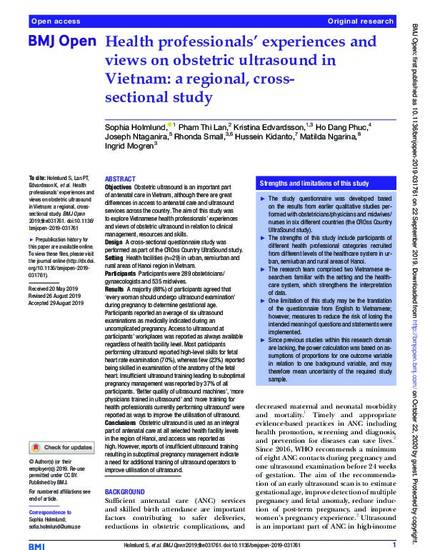
Objectives: Obstetric ultrasound is an important part of antenatal care in Vietnam, although there are great differences in access to antenatal care and ultrasound services across the country. The aim of this study was to explore Vietnamese health professionals' experiences and views of obstetric ultrasound in relation to clinical management, resources and skills.
Design: A cross-sectional questionnaire study was performed as part of the CROss Country UltraSound study.
Setting: Health facilities (n=29) in urban, semiurban and rural areas of Hanoi region in Vietnam.
Participants: Participants were 289 obstetricians/gynaecologists and 535 midwives.
Results: A majority (88%) of participants agreed that 'every woman should undergo ultrasound examination' during pregnancy to determine gestational age. Participants reported an average of six ultrasound examinations as medically indicated during an uncomplicated pregnancy. Access to ultrasound at participants' workplaces was reported as always available regardless of health facility level. Most participants performing ultrasound reported high-level skills for fetal heart rate examination (70%), whereas few (23%) reported being skilled in examination of the anatomy of the fetal heart. Insufficient ultrasound training leading to suboptimal pregnancy management was reported by 37% of all participants. 'Better quality of ultrasound machines', 'more physicians trained in ultrasound' and 'more training for health professionals currently performing ultrasound' were reported as ways to improve the utilisation of ultrasound.
Conclusions: Obstetric ultrasound is used as an integral part of antenatal care at all selected health facility levels in the region of Hanoi, and access was reported as high. However, reports of insufficient ultrasound training resulting in suboptimal pregnancy management indicate a need for additional training of ultrasound operators to improve utilisation of ultrasound.
Available at: http://works.bepress.com/hussein_kidanto/26/
